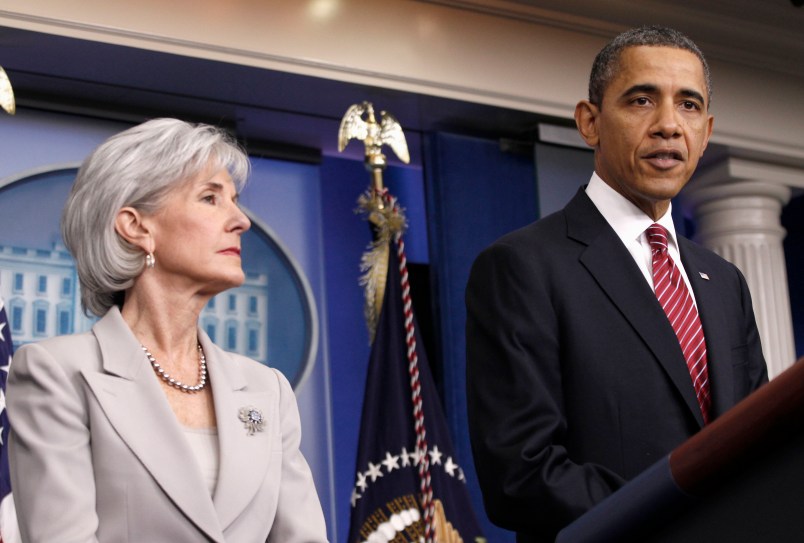On Tuesday, the Supreme Court will hear two landmark cases about the validity of a rule under Obamacare that employer health plans must cover emergency contraceptives for female employees without co-pays.
The cases carry potentially far-reaching implications for Obamacare, access to birth control, the concept of corporate personhood and the extent to which religious liberty can exempt entities from laws they object to.
Who are the groups suing the government and why?
The first case the court will take up is Sebelius v. Hobby Lobby Stores, Inc. The second is Sebelius v. Conestoga Wood Specialties Corp. The Supreme Court consolidated the cases and allotted a total of one hour for oral arguments on Tuesday morning. (Update: The Court has extended it to 90 minutes.)
Both are for-profit companies. Hobby Lobby is a Oklahoma-based arts and crafts retail chain with and Christian owners so devout that the stores close on Sundays. Conestoga Wood is a Pennsylvania-based manufacturer of wood doors and other furniture. Both sued to block the mandate to cover contraceptives like Plan B and Ella, saying it violates their religious liberty.
“Covering these drugs and devices would violate their most deeply held religious belief that life begins at conception, when an egg is fertilized,” said the Becket Fund for Religious Liberty, which represents Hobby Lobby.
On what basis are they suing?

The groups say the mandate runs afoul of the Religious Freedom Restoration Act, a federal law enacted in 1993, which holds that government may not “substantially burden” a person’s exercise of religion unless it demonstrates a “compelling governmental interest” and employs the “least restrictive means” of furthering that interest.
It was passed to limit the impact of court rulings that Congress said impeded with religious freedom. Lawmakers justified RFRA under the First Amendment’s free exercise clause.
What’s the Obama administration’s legal defense?
The administration says for-profit entities don’t get a pass on the law because they employ and serve members of the general public, unlike houses of worship (which are exempt from the mandate) and religious nonprofits (which can opt out of paying for the coverage). The president’s legal team contends that the birth control rule doesn’t substantially burden free exercise of religion and merely ensures that female employees are treated equally regardless of their boss’ religious views.
The basis for the mandate was to guarantee consumers a basic package of preventive services, based on recommendations from the Institutes of Medicine, aimed at improving health outcomes and saving money.
Who are the lawyers?
Superstar conservative lawyer Paul Clement will be arguing for the challengers; U.S. Solicitor General Donald Verrilli will be defending the mandate for the administration.
How did the lower courts rule?
The rulings were split: Hobby Lobby won at the 10th Circuit Court of Appeals, and Conestoga Wood lost at the Third Circuit Court of Appeals. The Supreme Court subsequently agreed to settle the disputed rulings — as it usually does when circuit courts are divided on the validity of a federal law.
How worried should supporters of the mandate be?

Very. This Supreme Court is, according to one study, the most conservative since the 1930s and is sensitive to allegations of state encroachment on religious liberties. More broadly, this court is no fan of Obamacare: in 2012, four justices voted to wipe out the entire law and the swing justice succeeded at slicing off the requirement that states expand Medicaid. So liberal supporters of the mandate have reason to be concerned.
“There is a strong likelihood that this court will say the contraception mandate violates religious freedom,” speculated Adam Winkler, a law professor at UCLA who supports the mandate.
What happens if the Supreme Court overturns the mandate?
It really depends on the scope of the decision. But the most direct impact would be that for-profit companies like Hobby Lobby can get out of the birth control requirement if they successfully cite a religious objection to abiding by it.
The broader impacts are unknown until a ruling comes down. A defeat for the government would expand the concept of corporate personhood by concluding that a for-profit business can hold religious beliefs that afford it special treatment under the law. In the longer-term, religious business owners might feel empowered to sue to get out of other laws they say violate their religious liberty.
What if the Obama administration wins?
The injunction would be lifted and the contraception mandate, which took effect on August 1, 2012, would apply to entities like Hobby Lobby.
What do congressional leaders say?

Like Obamacare itself, attitudes toward the birth control mandate largely break down on party lines. House Speaker John Boehner (R-OH) has said he hopes the Supreme Court reverses the requirement, while Democrats broadly support it.
“Exempting secular, for-profit corporations from the Affordable Care Act’s contraceptive-coverage requirement is inconsistent with RFRA’s legislative history and intent,” wrote 19 Democratic senators, all of whom were serving in 1993 and voted for RFRA, in a friend-of-the-court brief.
When will the Supreme Court make a decision?
By the end of this June. Could be earlier but don’t count on it.
So … just to be clear, no one is taking away my birth control, right?
No! Well, not quite. The case is about whether the federal government can require employer-based insurance plans to provide it. Women can still buy it on the market no matter what happens at the Supreme Court. But it is an access issue: birth control costs a lot of women a lot of money, and unwinding the requirement makes it tougher for some of them to afford contraceptives.










